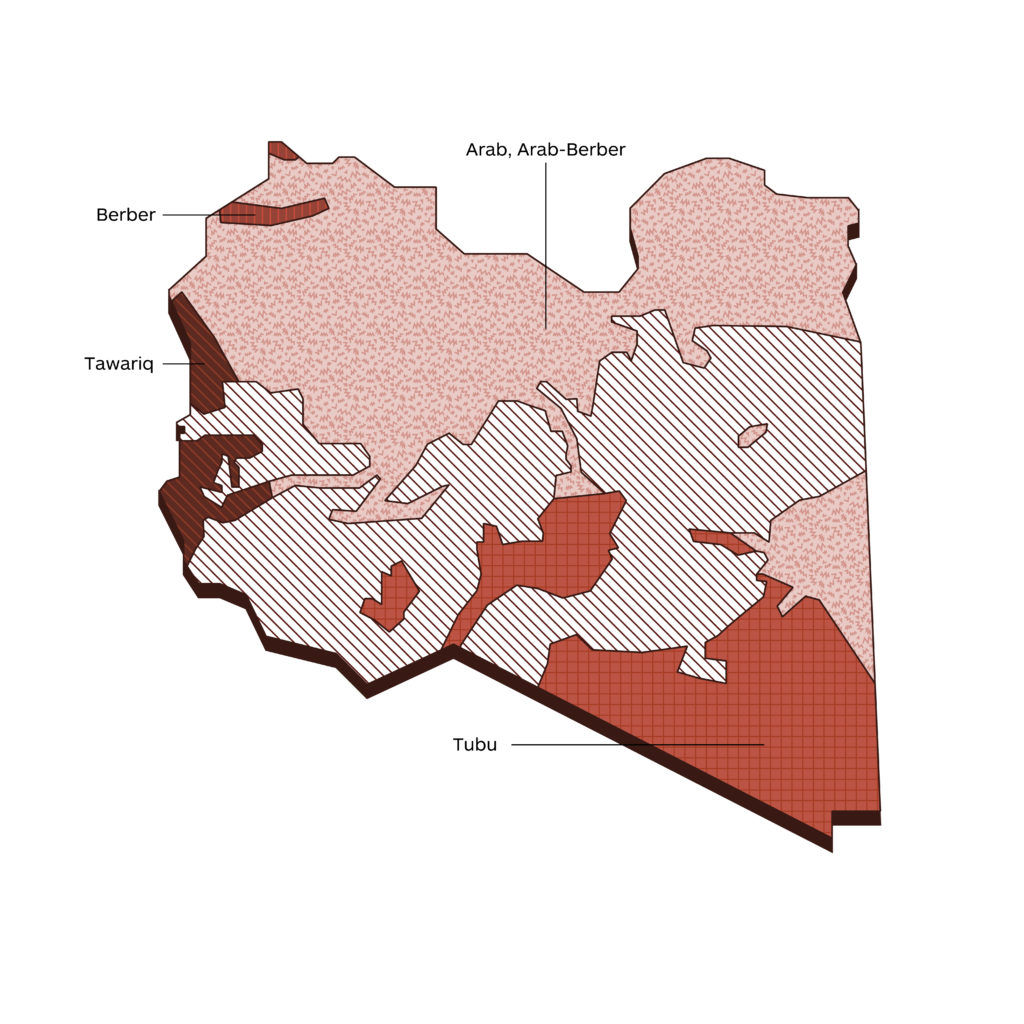Africa
To which language should you translate to localize in Libya?
LANGUAGE INSIGHT
Official language
Arabic (96%)
Actual languages
Arabic (96%), Berber (1%), other (3%)
What the top 150 best localized websites in the world do in Libya
(Top 150 websites listed in the Global by Design ranking – published annually by Byte Level Research, this report provides a list of globally localized websites, showcasing best practices and emerging trends in their globalization)
- 19/150 localize by translating into Arabic
- 2/150 localize by translating into both Arabic and French
- 1/150 localizes by translating into both French and Portuguese
-
3M
-
ABB
-
Accenture
-
Adidas
-
Adobe
-
Airbnb
-
Aldi
-
Amazon
-
American Airlines
-
American Express
-
Apple
-
Audi
-
Autodesk
-
Avis
-
Bayer
-
BMW
-
Booking.com
-
Bosch
-
British Airways
-
Bumble
-
Burberry
-
BYD
-
Canon
-
Capgemini
-
Cartier
-
Caterpillar
-
Chevrolet
-
Cisco Systems
-
Citibank
-
Coca-Cola
-
Costco
-
Dell
-
Deloitte
-
Delta
-
DHL
-
Disney+
-
Dyson
-
eBay
-
Eli Lilly
-
Emirates
-
Ernst & Young
-
Facebook
-
FedEx
-
Ford
-
Four Seasons
-
Fujifilm
-
GE
-
Gillette
-
GoDaddy
-
Google
-
Gucci
-
Haier
-
Heineken
-
Hermès
-
Hertz
-
Hilton
-
Hisense
-
Hitachi
-
Honda
-
Hotels.com
-
HP
-
HP Enterprise
-
HSBC
-
Huawei
-
Hyatt
-
Hyundai
-
IBM
-
IKEA
-
Intel
-
InterContinental Hotels
-
J&J
-
Jack Daniel's
-
Jehovah’s Witnesses
-
John Deere
-
Kellogg's
-
Kia
-
KPMG
-
L'Oréal
-
Land Rover
-
LEGO
-
Lenovo
-
Lexus
-
LG
-
Louis Vuitton
-
Lululemon
-
LUSH
-
Marriott
-
MasterCard
-
McDonald's
-
Mercedes-Benz
-
Merck
-
Microsoft
-
Mitsubishi Electric
-
Nestlé
-
Netflix
-
Nike
-
Nikon
-
Nintendo
-
Nio
-
Nissan
-
NIVEA
-
Oracle
-
Pampers
-
Panasonic
-
PayPal
-
Pepsi
-
Pfizer
-
Philips
-
Pitney Bowes
-
Porsche
-
Procter & Gamble
-
PWC
-
Revolut
-
Rolex
-
Royal Caribbean
-
Salesforce
-
Samsung
-
Sanofi
-
SAP
-
Sephora
-
Shopify
-
Siemens
-
Sony
-
Spotify
-
Starbucks
-
Steelcase
-
Stripe
-
Subaru
-
Tesla
-
The Church of Jesus Christ of Latter-day Saints
-
Tiffany
-
Tinder
-
Toshiba
-
Toyota
-
TripAdvisor
-
Uber
-
United Airlines
-
UPS
-
Visa
-
Volkswagen
-
Volvo Cars
-
Vrbo
-
Walmart
-
Western Union
-
Wikipedia
-
Wise
-
WordPress
-
Workday
-
Xerox
-
Xiaomi (Mi)
-
Zara
-
Zoom
If you need others information, below you can find a selection of economic/social/cultural data
Overview
Language
Official language
Arabic (96%)
Actual languages
Minorities languages: Berber, Domari and Tedaga.
Most studied languages
English, Italian, French.
T-index
0.014%
T-Index ranks countries according to their potential for online sales.
English
Very low proficiency (EF) – 108 of 111 countries/regions in the world- 19/20 position in Africa.
Demography
Capital: Tripoli
Currency: Libyan dinar
Population: 6,8 m
Population density: 4/km2
Economy
GDP: 45.75 billion USD (2022)
GDP per capita: 6,716.1 USD (2022)
Exports: $30.8 billion (2021)
Statistics
Internet users: 45.9% penetration, 3.14 million
Unemployment rate: 19%
Urbanisation: 81% (2022)
Literacy: 86%
Conventions
Date format: dd – mm – yyyy
Time: 24h time system
Country code: 00218
Language data sources: Worldatlas/Britannica//EF/Wikipedia; Demography data sources: IMF/Worldometers; Conventions data source: Wikipedia; Economy data sources: WTO/OEC/CIA/Esomar/Datareportal; Statistics data sources: Datareportal/WorldBank/UN/UNESCO/CEIC/IMF/Culturalatlas/Commisceoglobal
Facts and data
Economy
Imports
$18.3 billion (2021). Refined Petroleum ($3.66B), Rolled Tobacco ($636M), Broadcasting Equipment ($590M), Cars ($579M), and Jewellery ($424M), importing mostly from Turkey ($2.77B), Greece ($2.38B), China ($2.13B), United Arab Emirates ($1.71B), and Italy ($1.43B).
Financial inclusion factors (over 15 years of age)
• 65.7% have an account with a financial institution
• 10.3% have a credit card
Exports
$30.8 billion (2021). Crude Petroleum ($27B), Petroleum Gas ($1.94B), Refined Petroleum ($592M), Scrap Iron ($336M), and Gold ($236M), exporting mostly to Italy ($7.47B), Germany ($3.26B), Spain ($3.05B), China ($2.84B), and France ($1.94B).
Ease of doing business
Ease of conducting business is very low (rated 32.7 out of 100). Ranked 19th out of 20 Middle East and North African countries. Ranked 186th out of 190 countries worldwide (2022, World Bank).
Economy data sources: WTO/OEC/CIA/Esomar/Datareportal
Service Imports (2018)
Service Exports (2018)
Source: OEC
Historical Data Trade Imports
The following section uses historical trade data imports from partners of Libya.
Historical Data Trade Exports
The following section uses historical trade data exports from partners of Libya.
Source: OEC
The Top Export Opportunities for Libya by Relatedness
Relatedness measures the distance between a country's current exports and each product by showing only products that Libya is not specialized in.
Libya's Most Complex Exports
The Product Complexity Index (PCI) measures the knowledge intensity of a product by considering the knowledge intensity of its exporters.
Source: OEC
Libya's Most Specialized Products
Specialization is measured using Revealed Comparative Advantage (RCA), an index that takes the ratio between Libya observed and expected exports in each product.
Source: OEC
Market Growth Imports (2018)
This score represents the likelihood that the given country will start importing that product in the next few years. It forecasts the opening of a new specific market.
Market Growth Exports (2018)
This score represents the likelihood that the given country will start exporting that product in the next few years. It forecasts the opening of a new specific market.
Source: OEC

T-index
Reach most of the online purchasing power
T-Index ranks countries according to their potential for online sales. It estimates the market share of each country in relation to global e-commerce.
Try it nowMedia
Media language Arabic, English.
Information channels
Libya has had a fluid and fractured media landscape since the overthrow of Muammar Gaddafi in 2011.
The existence between 2014 and 2021 of rival authorities in the west and east created political and media polarisation and enduring rivalry between key players.
As part of a new push for reconciliation under a unified interim government, parallel “state media” run by the two administrations are being merged.
Editorial stances shift, depending on the political and military situation.
The battle of narratives on social media and TV has fuelled disinformation. Foreign players whose interventions in Libya have increased are also involved in media messaging.
There is a diverse media environment, with a multitude of outlets and a variety of platforms. Satellite TV is a leading news medium. Stations’ social media accounts are key news sources. Some prominent outlets are based outside Libya.
Local and international journalists face threats and attacks. Despite infrastructure limitations, internet use is rising markedly year by year.
The press
Al-Shuruq – Tripoli-based weekly
Al-Wasat – Cairo-based weekly
Brnieq – Benghazi weekly
The Libyan Address – publishes in English and Arabic
Television
218 TV – private satellite station, based in Jordan. Also runs 218 News
Libya al-Ahrar TV – private satellite channel, now based in Turkey
Al-Salam TV – private, satellite station based in Turkey
Libya al-Hadath – private, linked to Gen Haftar’s family
Al-Rasmeya and Al-Wataniya – Tripoli-based, representing Government of National Unity (GNU)
Al-Wasat – private, via satellite, based in Cairo
Libya’s Channel – private, via satellite, based in Amman
Radio
Wataniya – state-run, based in Tripoli
Tripoli FM – private, Tripoli
Lebda FM – private, Tripoli
Libyana Hits – private, based in Benghazi
Al-Wasat – private, based in Egypt, on FM in Libyan cities
News agency
Libyan Arab News Agency (Lana) – the parallel east and west “state” news agencies, both named the Libyan Arab News Agency (Lana) or Wakalat al-Anba al-Libiyah (WAL), announced in 2021 they would merge
Arraed News Network – Tripoli-based, Islamist-affiliated
Ean Libya – London-based news site
Libyan Cloud News Agency – Tunis-based, European-backed
Al-Wasat – Cairo-based news site
Fassato News Agency – Rome-based news site
Libya Herald – English-language news
Afrigate News – news website
All Libyan Blogs – blog aggregator
Media data source: BBC
Internet Data
Internet users
45.9% penetration, 3.14 million
Share of web traffic by device
80.70% mobile phones, 18.57% computers (laptops and desktops), 0.71% tablet devices and 0.02% other devices
Median speed of mobile Internet connection
14.48 Mbps
Median speed of fixed Internet connection
8.86 Mbps
Mobile connection as a percentage of total population: 175.9%
Percentage of mobile connections that are broadband (3G-5G): 85.6%
Most popular web search engines
Google (97.1%), Bing (1.84%), Yandex (0.36%), Yahoo! (0.35%), Petal Search (0.19%), other (0.15%).
Most used social media
Facebook (72.14%), Twitter (11.9%), YouTube (7.67%), Instagram (7.15%), Pinterest (1.01%), LinkedIn (0.04%), Reddit (0.04%), other (0.05%).
Internet data sources: Datareportal/Statcounter
Social statistics
Life expectancy
72 yrs (2021)
Gender
Although the law confers Libyan women with the same rights as men, some workplaces cannot be run by women, such as those in which the physical strength of men is required. Women in Libya enjoy all the rights to earn promotions and have the same job application opportunities as men. In addition, female workers usually get special considerations from their bosses due to their other responsibilities as mothers and wives.
Class
In the workplace, attributes such as education can count and well-educated people earn other people‘s respect both at work and outside of the workplace. Wealth-status will have no impact in the workplace. The majority of the population in Libya belongs to the middle class.
Corruption perceptions Index
Libya scored 17 out of 100, ranked 171st out 180 countries worldwide.
Religion
Islam is the official religion in Libya. In fact, all Libyans are practicing Muslims. However, in the workplace and elsewhere, other religions are always respected. Foreigners are expected to respect the dominant religion; for example one should not smoke or eat in public places during the month of Ramadan.
Ethnicity
In the workplace, usually a worker‘s ethnic origin is irrelevant – especially for those who work in the capital, Tripoli. However, in other places, ethnic diversity may be discussed. Cities vary in culture and traditions.
World Happiness Index
Libya ranked 86th out of 146 countries, with a score of 5.330.
Current health expenditure
6.05% of GDP
CO2 emissions
6.7 metric tons per capita
Social statistics sources: WorldBank/UN/UNESCO/CEIC/IMF
The Data Factbook is a work in progress project. Our community is helping us to fill it up always with new and updated data. Your contribution is precious. If you want to help us, please write your advices at imminent@translated.com
Languages research
Languages and dialects spoken in Libya

Legend
-
Arab, Arab-Berber
-
Berber
-
Touareg
-
Tebou
-
Uninhabited
The geographical distribution of languages that you will find in the maps published in this section is a work in progress. Our community is helping us to fill it up with always new and updated data. Your contribution is precious. If you want to help us, please write to imminent.factbook@translated.com
Photo credit: Creative Photo Corner, Unsplash


